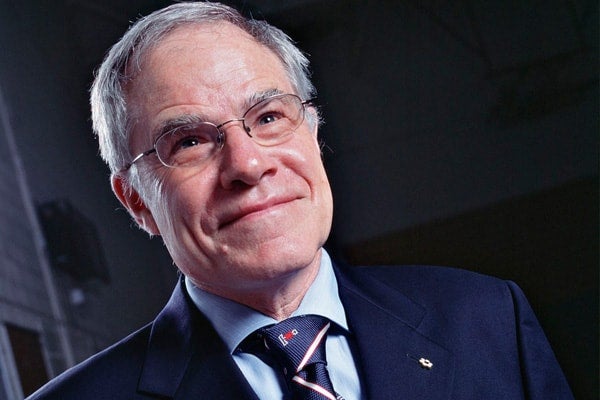
Sport, power and abuse
Published: November 14, 2011
Penn State University has been in an uproar since it was revealed that an assistant football coach had allegedly been caught abusing young boys and no action had been taken. Writer Anjum Nayyar talked with Professor Bruce Kidd of physical education and health about sports culture in the U.S. and Canada and about the need for ethics in sport.
Q. Can you talk a bit about the culture of American football and what makes it so strong?
A. We have absolutely no equivalent to it anymore in Canadian society or in any other sporting nations of the world. It’s something we marvel at and wonder at in a society that is similar to ours in many ways, but is also strange in many ways. The differences in the athletic budgets of the Penn and Ohio State universities in that category and universities in Canada or any other part in the world are amazing. It’s always been a wonder.
Some Canadian university alumni would say there was a similar culture in Canada in the 20s, 30s and 40s, and I think that that was true. By the mid- to late-50s it had begun to wane in major universities in Canada. It continued to accelerate in the United States and 50 years later, it’s a striking Canada – U.S. difference. But there are some qualifications: it’s principally in the rural areas or small towns [that U.S. football culture thrives]. Columbia, Yale or Harvard football are more like U of T or the University of Western Ontario football. They have the devoted followings but I don’t believe they have tailgate parties and 100,000 people. It’s only a vestige in those universities as well.
I understand from some of our presidents and provosts that when they go to Association of American Universities meetings in the U.S., their colleagues take them aside and tell them, “You’re so lucky you don’t have to deal with football.” Although it brings visibility and dollars, it brings a ton of headaches because of issues like this where you have a really strong research university reduced in symbolic ways to a sports team and a coach.
At U of T some sociologists would argue that one of the reasons for the demise of the football culture at U of T and others is the demographic transformation of the student body from a white, Protestant one to a multi-cultural one. Others have argued it’s a consequence of the tremendous television-fueled growth of the sport-media complex, which promotes professional sport at the expense of intercollegiate sport, and the growth of the urban entertainment industries generally, which means that there are many engaging cultural alternatives to watching Varsity sport.
Q. There’s been some commentary in the news that the first rule of a locker room is that whatever you see there stays there. You don’t tell anyone. What are your thought on this?
A. From my own experience in athlet ics and my own colleagues who have studied football, I would agree that that has been the culture. It starts with a sense of solidarity. These are your teammates and you have tremendous bonds with them. Your first responsibility is your loyalty to them and the privacy of those close intimate relationships.
But there has to be some limits on the cone of silence it creates, especially in situations like this. There’s been a real effort in many parts North American sport, to combat overt aggressive sexism, racism, and homophobia. Although there’s been a mixed, uneven commitment or follow-up on this, there have been heart-warming examples to address that. The good news was that in this case, although he didn't intervene to stop the alleged rape, this young assistant came forward. That’s evidence that this generation taking responsibility for calling colleagues on outrageous behaviour. I think the way the university acted is another example that there’s no longer a code of silence around the dressing room.
Q. We’ve heard of several cases about drugs, abuse etc. being covered up; is sport more vulnerable than other fields of endeavour?
A. I’m not sure it’s more vulnerable. Because of the spotlight and because of the conferring of representational status upon athletes and coaches, the emotional stakes become much higher. Sport professes to live a code of ethics. The burden is much greater. It’s in the spotlight; it claims to represent communities and claims to operate under a code of fair play and respect for others. I think a lot of sports people accept those obligations and try to walk that talk.
Q. Why are sports personalities so revered in general? Where does that come from?
A. It is a great question and a lot of people have tried to answer this. It has roots in the ancient Olympic Games of classical Greece when athletes were were widely considered symbolic representatives of their city-states, and if victorious, awarded life pensions. In the medieval period you had some disputes settled not by armies, by but by champions in one-on-one combat. In our own time, it is has been accentuated by the fact that the promoters of sport very early on made a marketing effort to link the athletes and teams to the city or region they came from.
A colleague once said to me, as an infant you’re carried around, lifted, provided food by these amazing creatures: your parents. They’re your first champions and you learn to admire physically gifted, strong, caring people who do these physical feats.
Q. What are responsibilities of coaches? Is there a code of ethics? Should we have one?
A. There has been a code of ethics developed by coaches and institutions in Canada, at least in the Olympic and educational sports, as we have had to face cases of sexual assault and sexual harassment, and other challenges. We all now have police checks for employees and our faculty now will not hire anyone now without a police check.



